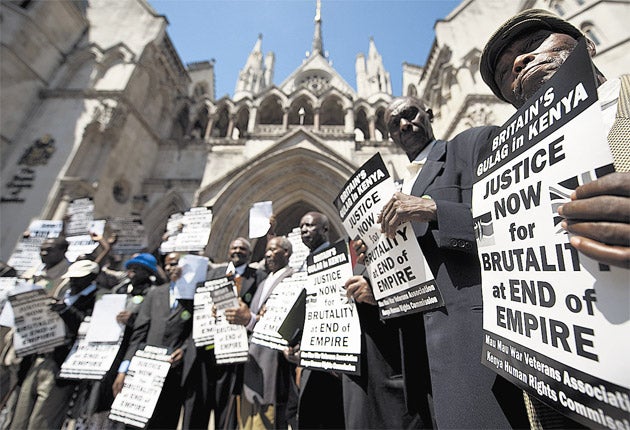Kenyans' 4,000-mile journey for justice
Five decades after the Mau Mau uprising, the battle for compensation for British atrocities comes to court

Your support helps us to tell the story
From reproductive rights to climate change to Big Tech, The Independent is on the ground when the story is developing. Whether it's investigating the financials of Elon Musk's pro-Trump PAC or producing our latest documentary, 'The A Word', which shines a light on the American women fighting for reproductive rights, we know how important it is to parse out the facts from the messaging.
At such a critical moment in US history, we need reporters on the ground. Your donation allows us to keep sending journalists to speak to both sides of the story.
The Independent is trusted by Americans across the entire political spectrum. And unlike many other quality news outlets, we choose not to lock Americans out of our reporting and analysis with paywalls. We believe quality journalism should be available to everyone, paid for by those who can afford it.
Your support makes all the difference.The five elderly Kenyans who stood on the steps of the Royal Courts of Justice had, until yesterday, never set foot outside of Africa.
They had travelled 4,000 miles to London to secure an apology – and compensation – from the British Government over the killing, torture and abuse they say was suffered by thousands of Mau Mau fighters during the 1950s and 60s.
For Ndiku Mutua, born in 1932 in Kilungu village in the Machakos district of Kenya, it is a last chance to force Britain to acknowledge its role in his torture. Mr Mutua says he was beaten and castrated after admitting giving food to the Mau Mau supporters who were living in a nearby forest during the early 1950s.
He told the district authorities that he sympathised with the independence movement and supplied the Mau Mau rebels with four cows. Mr Mutua, now 77, was arrested by four soldiers who beat him with rifle butts with such ferocity that they broke his jaw.
The herdsman was later taken to Lukenya Detention Centre where he was stripped and taken to a separate room. In that room Mr Mutua was forcibly castrated with pliers. Despite the pain he managed to escape with three other men who had also been castrated. He was lucky and survived his ordeal after receiving medical treatment in secret from the local hospital. His three colleagues all died from their injuries.
Mr Mutua, who never married, said yesterday: "I live with the physical and mental scars of what happened to me. Not a day goes by when I do not think of these terrible events. At last I can tell my story and at last I can hope for justice from the British courts."
His story is among five test cases filed yesterday at the High Court in a legal action that could bring compensation for thousands of Kenyans who also claim to have suffered at the hands of the British.
The London-based human rights law firm Leigh Day & Co and African and British historians have helped to uncover detailed archival research which they claim makes clear that far from being the acts of a few rogue soldiers, the torture and inhuman and degrading treatment of Kenyans during this period resulted from policies which were sanctioned at the highest levels of the British government by the then Colonial Secretary. The Kenyan Human Rights Commission has now documented more than 40 cases of castration, severe sexual abuse and unlawful detention. In all the documented cases it is alleged that the acts of torture were carried out directly by officers of the British colonial government.
Martyn Day, a senior partner at Leigh Day & Co, said: "Although these events took place 50 years ago, the repercussions of what happened have stayed with the victims and Kenyan society to this day.
"By bringing these claims we hope to obtain justice for these Kenyans. However, it is also time for us Britons to come to terms with this historic wrong which is a stain on British history."
He added: "It is ironic that, at the time Britain was instrumental in the creation of the post-war human rights treaties, conventions and institutions, it was violating fundamental human rights in Kenya on a breathtaking scale."
Join our commenting forum
Join thought-provoking conversations, follow other Independent readers and see their replies
Comments